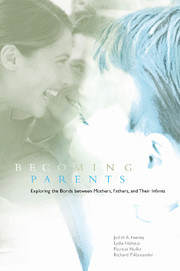Book contents
- Frontmatter
- Contents
- Preface
- 1 The Transition to Parenthood
- 2 Attachment in Childhood and Beyond
- 3 The Study
- 4 The Couples
- 5 Pregnancy and Plans for Birth
- 6 Couples' Experiences of Birth and New Parenthood
- 7 How Does New Parenthood Affect Couples?
- 8 Dealing with Depression
- 9 Men, Women, and Household Work: The Diaries
- 10 Couples' Changing Attachment Relationships
- 11 Six Months into Parenting
- 12 New Parenthood in Perspective
- Appendix A Core Questionnaires Completed by Couples
- Appendix B Summary of Sample Characteristics
- Appendix C Summary of Major Statistical Analyses
- References
- Author Index
- Subject Index
3 - The Study
Published online by Cambridge University Press: 05 June 2012
- Frontmatter
- Contents
- Preface
- 1 The Transition to Parenthood
- 2 Attachment in Childhood and Beyond
- 3 The Study
- 4 The Couples
- 5 Pregnancy and Plans for Birth
- 6 Couples' Experiences of Birth and New Parenthood
- 7 How Does New Parenthood Affect Couples?
- 8 Dealing with Depression
- 9 Men, Women, and Household Work: The Diaries
- 10 Couples' Changing Attachment Relationships
- 11 Six Months into Parenting
- 12 New Parenthood in Perspective
- Appendix A Core Questionnaires Completed by Couples
- Appendix B Summary of Sample Characteristics
- Appendix C Summary of Major Statistical Analyses
- References
- Author Index
- Subject Index
Summary
The study we report in this book was designed to provide a comprehensive picture of couples' responses to the transition to parenthood. Based on attachment principles and on previous research into first-time parenthood, the areas we selected for study included relationship satisfaction, attachment, caregiving, sexuality, general psychological adjustment, coping resources and coping styles, and division of household labor. As described in more detail in the next chapter, we recruited two groups of couples: one group who were experiencing their first pregnancy (called the transition group), and another group who reported that they were not planning to have children in the near future (called the comparison group).
OVERVIEW OF THE DESIGN
In Chapter 1, we pointed out the importance of longitudinal studies, which allow researchers to observe couples as they experience pregnancy and new parenthood. The study we designed involved couples providing major sets of data at three points in time: during the second trimester of pregnancy, about six weeks after the baby was born, and when the baby was six months old (couples in the comparison group were assessed at similar time intervals). Between the second and third assessment points, spouses also completed structured diaries detailing their involvement in household and baby-related tasks over a four-day period. By following the couples throughout pregnancy and the first six months of parenthood, we were able to chart the course of their relationships and identify changes linked to this major event in the life cycle.
- Type
- Chapter
- Information
- Becoming ParentsExploring the Bonds between Mothers, Fathers, and their Infants, pp. 48 - 59Publisher: Cambridge University PressPrint publication year: 2001



